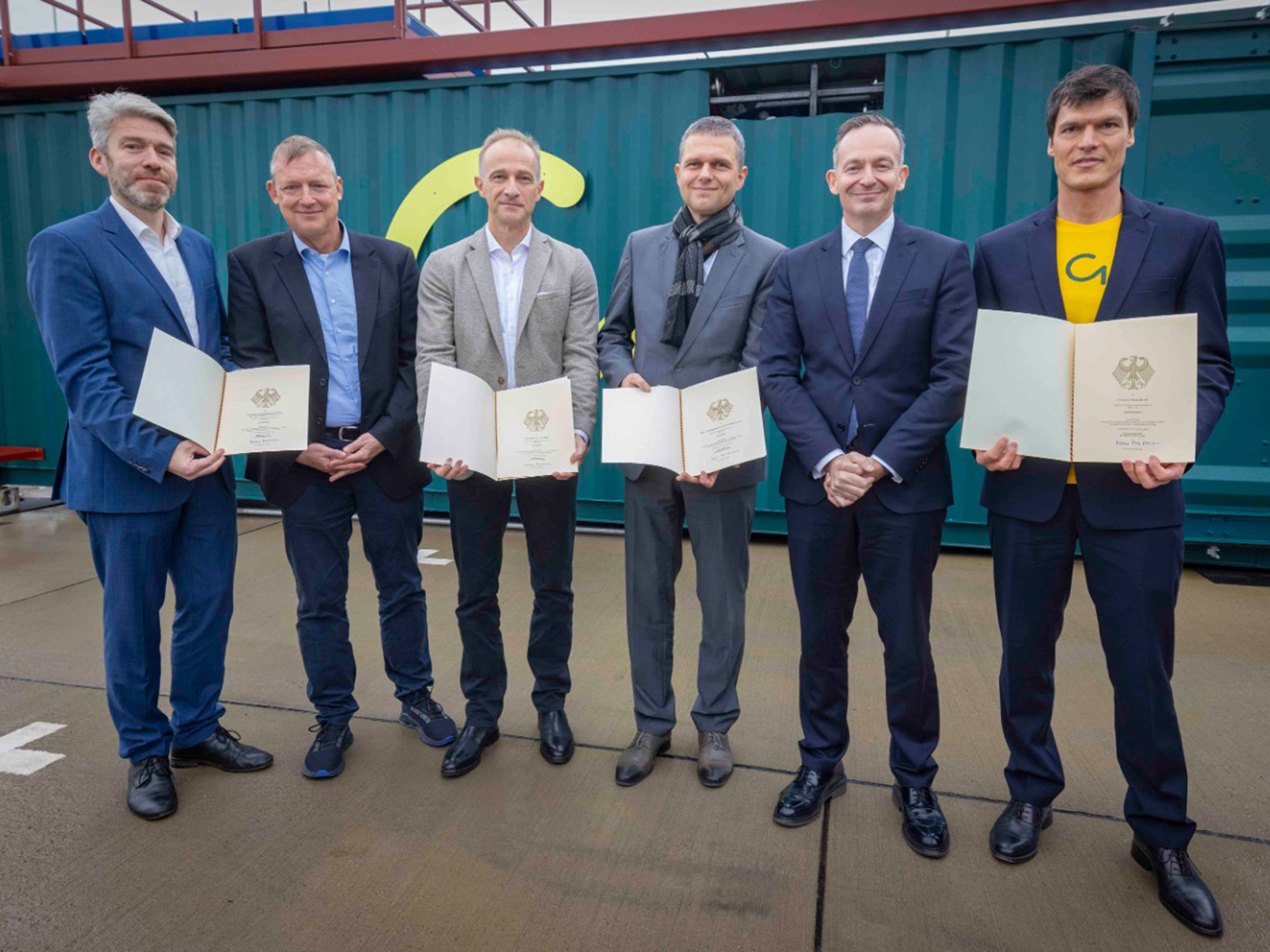Handover of the funding decision
A new production process to enable the cost-efficient market ramp-up of green methanol
The world’s first pilot plant for the cost-efficient production of green methanol was inaugurated today in the Leuna Chemical Park as part of the Leuna100 project. Behind it is a research consortium made up of the climate-tech start-up C1 Green Chemicals AG and its partners, Fraunhofer Institute for Wind Energy Systems IWES, Fraunhofer Institute for Environmental, Safety and Energy Technology UMSICHT, DBI – Gastechnologisches Institut gGmbH Freiberg, and the Technical University of Berlin (TU Berlin). The goal is to utilize a fundamentally new production process to enable the cost-efficient market ramp-up of green methanol and thus offer the container shipping industry a climate-neutral alternative fuel.

Innovative process for green methanol production
Green methanol production is based on a synthesis gas of carbon monoxide and green hydrogen – hydrogen produced with renewable energy. The process for green methanol production in the Leuna100 project is composed of three steps: synthesis gas production, methanol production, and purification of the crude methanol produced. The innovative technology developed by C1 enables efficient low temperature- and low pressure-based methanol production. The process is made possible by the use of a homogeneous, manganese-based catalysis technology that C1 has developed in cooperation with Leibniz-Institut für Katalyse e. V. (Leibniz Institute for Catalysis). The electricity-based and load-flexible utilization of synthesis gas production and the homogeneous catalysis for the methanol production together form the key innovation.
The pilot plant sees two different technologies coupled for the CO2-based production of synthesis gas: Fraunhofer UMSICHT is providing new, low-temperature co-electrolysis, while DBI – Gastechnologisches Institut gGmbH Freiberg utilizes a reverse water gas shift (RWGS) unit. C1 is delivering the groundbreaking catalyst as well as a reactor developed in-house for the homogeneous catalysis of methanol. Fraunhofer IWES is providing the location and infrastructure at the Hydrogen Lab Leuna and evaluating the load flexibility. TU Berlin is developing an efficient, load-flexible operating concept on the basis of a dynamic overall process model.
Industry history in the Leuna Chemical Park
The project is being funded by the German Federal Ministry for Digital and Transport (BMDV) with a total of €10.4 million over the next three years. Minister for Transport, Dr. Volker Wissing, said at the inauguration: “Industry history is being written today in Leuna. This project represents a milestone for the post-fossil fuel era in the shipping and aviation industries. We are proud to support this ‘made in Germany’ research project with funds from the Renewable Fuels Funding Program. With its funding program, the BMDV is supporting the further development and market ramp-up of renewable fuels and thus also the achievement of climate goals in the transport sector.”
BASF constructed the world’s first methanol plant in Leuna in 1923. Minister President of Saxony-Anhalt, Dr. Reiner Haseloff, emphasized this historical context: “The Leuna chemical complex can look back on over a century of tradition. During this time, it has consciously taken on challenges and proven its innovative strength time and again. The opportunity has now presented itself for Leuna to become the setting for the start of a whole new era. The Leuna100 project is making an important contribution to entering circular chemical production – and not just in Saxony-Anhalt.”
Tankers, container ships, and cruise liners are currently responsible for almost three percent of global annual CO2 emissions. The new climate strategy adopted by the International Maritime Organization in summer 2023 envisages reaching the goal of climate neutrality by around 2050. Emissions should be reduced by at least a fifth compared with 2008 by 2030 and even by at least 70 percent by 2040. Large shipping companies such as Maersk have already ordered methanol-compatible vessels, the first of which are already in use. Renewable fuels based on green hydrogen and CO2 also represent an alternative for the aviation industry. A further processing step involving the alcohol-to-jet (ATJ) process allows the potential production of kerosene from green methanol.
Christian Vollmann, CEO of C1 Green Chemicals AG: “Our innovative process offers the potential to produce green methanol more cost-effectively. We are delighted to have the opportunity to take our technology to the next level in the scope of the pilot plant and take a decisive step towards the market launch.”
Prof. Dr. Andreas Reuter, Managing Director Fraunhofer IWES, said: “With our many years of scientific expertise and a complex research infrastructure for renewable energies, including the Hydrogen Lab Leuna, Fraunhofer IWES is the ideal partner for the successful realization of projects for the production of green fuels for the shipping and aviation industries.”
Background
The Leuna100 project was launched in the Leuna Chemical Park in August 2023 and is set to run for three years. It is being funded with a total of €10.4 million by the German Federal Ministry for Digital and Transport (BMDV) as part of the Renewable Fuels Funding Program. The funding guideline for the development of renewable fuels is being coordinated by NOW GmbH and implemented by the project management agencies VDI/VDE Innovation + Technik GmbH and Fachagentur Nachwachsende Rohstoffe e. V.
The working group headed by Prof. Dr. Matthias Beller at Leibniz-Institut für Katalyse e. V. (LIKAT), Rostock, is supporting the Leuna100 project as a research partner.
 Fraunhofer Institute for Environmental, Safety and Energy Technology UMSICHT
Fraunhofer Institute for Environmental, Safety and Energy Technology UMSICHT